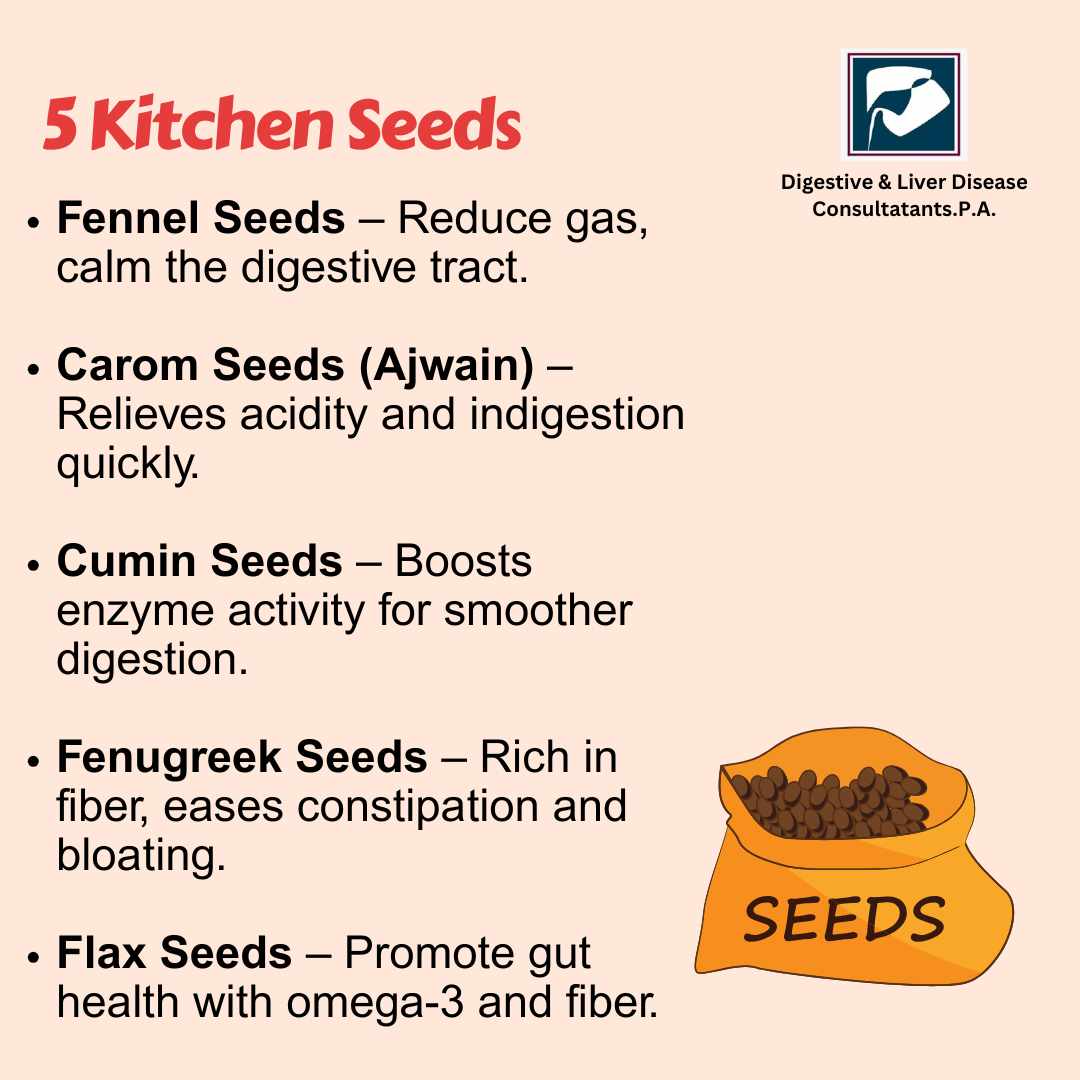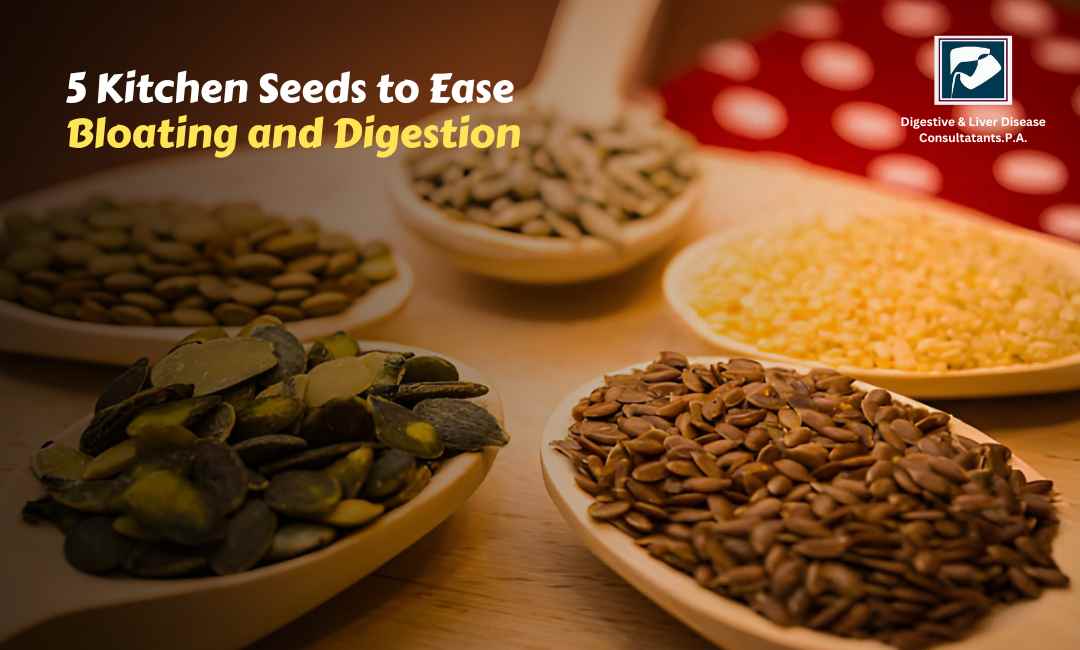Many of us know the uncomfortable feeling of bloating. Whether it happens after a heavy meal, due to food sensitivities, or from irregular digestion, bloating can leave you feeling sluggish and uneasy. The good news is that your kitchen may already hold some natural solutions. Seeds, which are often overlooked, are packed with fiber, essential oils, and digestive-friendly compounds that can help reduce bloating, ease gas, and support overall gut health.
1. Fennel Seeds
Fennel seeds are widely known as a natural digestive aid. In many cultures, they are chewed after meals to freshen breath and reduce discomfort. These tiny seeds contain essential oils that relax the gastrointestinal muscles, making it easier for trapped gas to pass through your digestive system.
How they help digestion:
- Reduce gas and bloating
- Relax the stomach muscles to ease cramps
- Support healthy bowel movements
How to use:
You can chew half a teaspoon of fennel seeds after a meal or brew them into a warm tea. Drinking fennel tea can also help calm indigestion and reduce nausea.

2. Cumin Seeds
Cumin seeds are not only a flavorful spice but also an excellent remedy for digestive problems. They stimulate the production of digestive enzymes and bile, which helps break down food more efficiently. Cumin also has anti-inflammatory properties that soothe the stomach lining.
How they help digestion:
- Improve nutrient absorption
- Reduce stomach acidity
- Help with indigestion and bloating
How to use:
Add cumin seeds to your daily cooking or prepare cumin water by soaking a teaspoon of seeds in warm water overnight. Drinking this water in the morning can boost digestion throughout the day.
3. Caraway Seeds
Caraway seeds are another powerful kitchen ingredient that supports gut health. They are rich in fiber and compounds that ease bloating, stomach cramps, and indigestion. Studies suggest that caraway can also help people with irritable bowel syndrome (IBS) by calming intestinal spasms.
How they help digestion:
- Reduce bloating and abdominal pain
- Support gut motility (movement of food through intestines)
- Relieve constipation
How to use:
You can sprinkle ground caraway seeds into soups, bread, or stews. Caraway tea, made by steeping the seeds in hot water, is also an excellent home remedy for digestive relief.
4. Flaxseeds
Unlike the other seeds mentioned, flaxseeds are particularly rich in soluble and insoluble fiber. This makes them excellent for people struggling with constipation or irregular bowel movements. The natural fiber helps soften stool and promotes smooth digestion.
How they help digestion:
- Add bulk to stool and prevent constipation
- Support healthy gut bacteria
- Provide omega-3 fatty acids that reduce inflammation
How to use:
Ground flaxseeds can be added to smoothies, oatmeal, or yogurt. Make sure to drink enough water when consuming flaxseeds to maximize their digestive benefits.
5. Chia Seeds
Chia seeds may be small, but they are a powerhouse of nutrients. When soaked in water, they form a gel-like consistency that aids digestion and supports bowel regularity. They are also rich in fiber, protein, and antioxidants, making them a great addition to a balanced diet.
How they help digestion:
- Improve bowel movements
- Reduce bloating and indigestion
- Keep you feeling full and satisfied longer
How to use:
Soak chia seeds in water or milk for at least 30 minutes before eating. They can be added to puddings, smoothies, or even baked goods.
Additional Tips for Reducing Bloating Naturally
While these seeds can be very helpful, it is also important to follow healthy lifestyle habits to maintain smooth digestion:
- Eat smaller, frequent meals instead of heavy portions.
- Avoid excessive carbonated drinks and processed foods.
- Stay hydrated by drinking enough water throughout the day.
- Include fiber-rich fruits, vegetables, and whole grains in your diet.
- Practice mindful eating and avoid eating too quickly.
When to See a Doctor
Occasional bloating and indigestion are common, but if you experience these symptoms frequently, it may be a sign of an underlying digestive issue. Conditions like irritable bowel syndrome (IBS), acid reflux, or food intolerances may require medical care.
At Digestive & Liver Disease Consultants, P.A., our team of expert gastroenterologists is dedicated to helping patients achieve better digestive health. With advanced diagnostic tools, personalized treatment plans, and compassionate care, we provide solutions for everything from common digestive discomforts to complex liver diseases.
Whether you are struggling with bloating, indigestion, or chronic digestive disorders, our specialists are here to help you find lasting relief.
Conclusion
Seeds such as fennel, cumin, caraway, flax, and chia are simple, natural, and effective ways to support your digestive health. They can help reduce bloating, ease stomach discomfort, and promote smoother digestion. However, persistent symptoms should never be ignored.
If you often struggle with digestive problems, don’t wait until they affect your daily life. Schedule an appointment with Digestive & Liver Disease Consultants, P.A. today and let our experienced gastroenterologists guide you toward better gut health.






